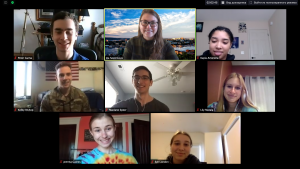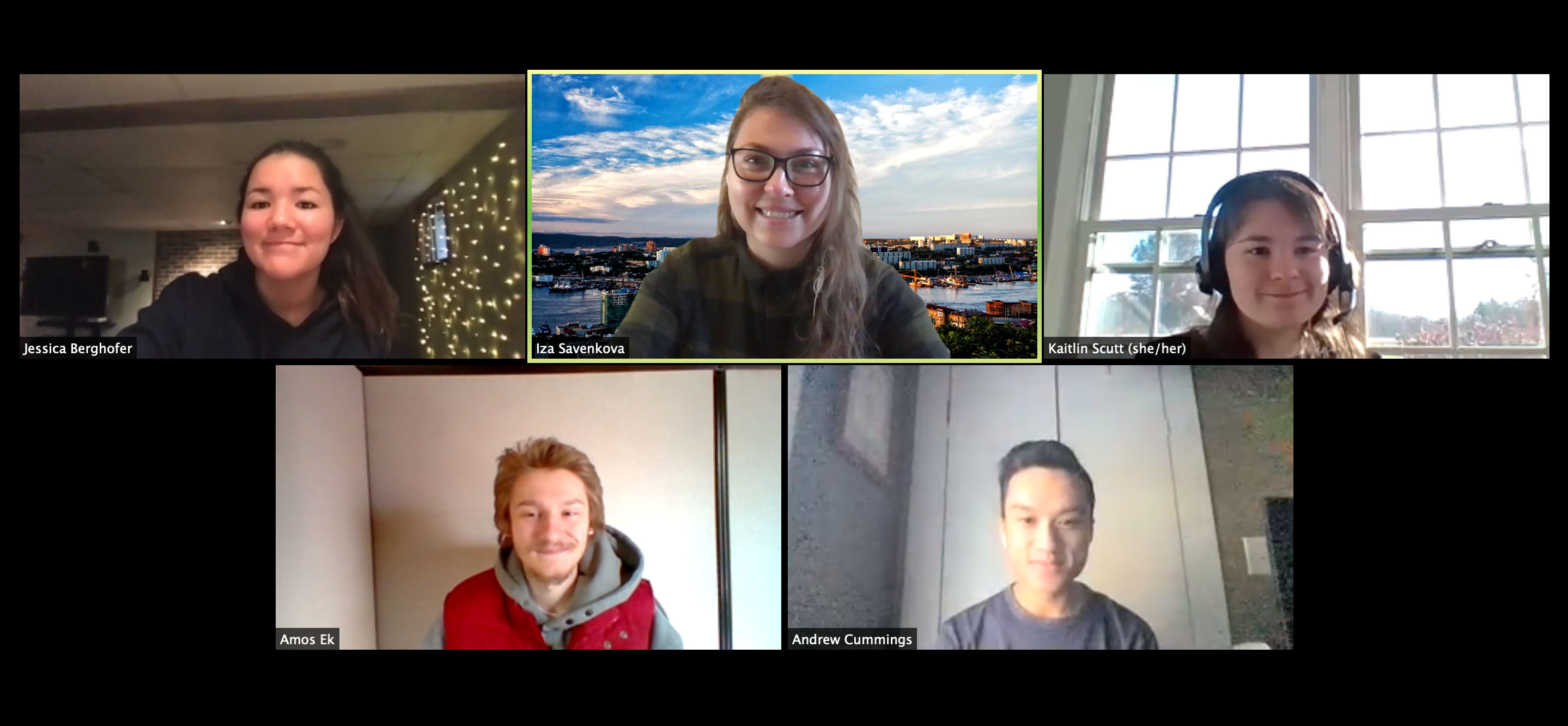We spoke with some Russian 101 students to get their perspective on what learning Russian has been like during the virtual fall 2020 semester.
What is your favorite part of Russian 101 this semester?
Eve London ’24: I really like my small class size. I think especially on Zoom, smaller classes are more engaging and productive. I also appreciate how understanding, encouraging, and helpful my professors have been this semester.
Jemma Gaines ’24: One of my favorite aspects of Russian 101 has been to discover linguistic concepts, similar and different, across Russian and English. Russian 101 has directed me as to languages’ potential diversity: Whereas ownership denotes possession in English, proximity denotes possession in Russian, for example, and whereas English encompasses motion by “to go”, Russian differentiates between unidirectional and multidirectional, vehicular and non-vehicular, motion. Concepts in language inherently reflect the originative thought, culture, and values of speakers; with this newfound awareness, I have begun to better comprehend and appreciate the wider global community.
Andrew Cummings ‘24: I really appreciate how supportive and kind the professors are and how they’ve gone out of their ways to try and connect everyone in the Russian department together by making group projects, Russian Table, and being easy to communicate with. Additionally, I have met new classmates that I can’t wait to see on campus one day and also students from Russia, which I think is a great way to actually use and practice the language, learn new things, and simply be able to be exposed to actual students from a different culture and perspective.
Peter Guma ‘24: My favorite part of 101 this semester is the collaborative assignments. We are all at different levels of language proficiency, but everyone has something to contribute.
What challenges are you facing with the online format?
Peter: My biggest challenge with learning a language over Zoom is “Zoom fatigue”. While staring at a screen drains my energy, meeting with my professors and peers outside of class is very convenient.
Jemma: What I perceive the greatest challenge to learning a language through Zoom is the physical disconnect between participants. Real-time interaction is invaluable to language; I suspect the physical classroom to allow a richer, more engaging linguistic experience than is potential by an online platform.
Andrew: The biggest challenge for me would probably be in terms of pronunciation. Sometimes the audio on Zoom is not the best so it may be hard to try to mimic the professor in the way they pronounce something.
Are there any benefits to a Zoom semester?
Peter: One benefit of taking Russian 101 online is the opportunity to communicate with foreign students in Moscow. I enjoy discussing the similarities and differences between our cultural and educational backgrounds.
Jemma: Russian 101 has incorporated virtual meetings and website materials into the remote curriculum. In a unit over food and the marketplace, for instance, students role-played via Zoom, and together prepared for a dinner party by “shopping” through an online Russian food service. … The component most special to the online format, nonetheless, is the ability to interact with students from the Higher School of Economics in Moscow. Collaboration with native Russian speakers fuels practical conversation and enhances student confidence, experience, and proficiency in the language. As well, these meetings allow personal, meaningful exposure to Russian culture.
Andrew: We have been doing a lot of partner activities using the breakout rooms feature on Zoom as well as group projects. I think this is unique to an online format because we are forced to practice and put to use our knowledge of the language as well as getting to actually talk to classmates even if they are not in our specific section. It creates more relationships and bonding between students that is difficult during these times.
Why did you decide to study Russian?
Andrew: I have been learning Russian on my own on and off throughout high school but have never had any real progress since I was always too busy with my actual schoolwork. In addition to this, I am fascinated with Russian and Slavic culture and I believe that Russian is a very beautiful language. … I plan on studying abroad in Russia during my time at Dickinson as well as perhaps majoring or minoring in Russian language.
Eve: My dad is fluent in Russian and has traveled to Russia every 2-3 months for work my whole life. Russian has always been like a secret code in my house and in college I wanted to learn to crack it.
Jemma: I initially registered for Russian due to my interest in ballet. Dance from a young age has informed my admiration for the renowned techniques, institutions, and schools which Russia offers to the art form. I have long hoped to visit Russia, to experience the country’s impeccable arts, and alongside this, to achieve fluency in a language apart from my native English. I intended Dickinson’s foreign language requirement to assist my approach of these aims; I did not expect, however, to have already learned so much!

